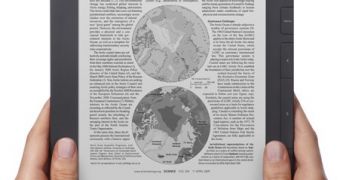That e-readers and e-books are making life hard for paperback books is not something new at all, but it looks like a certain analyst firm decided to look at just how big the effect already is, or will be.
For those that do not know, book revenue in the year 2010 was of roughly $25 billion, a figure that is only set to decrease during the next few years.
E-book readers only seriously started selling in late 2009, with 2010 being the year of shipment surge.
This prompted many authors and publishers to transform their books into electronic format and make them available for download.
One thing led to another and, now, physical books are found to have begun to sell less and less while e-books have grown.
This does mean that the world's population still likes to read, but book publishers don't really have a reason to feel much glee.
After all, according to iSuppli, book revenue will fall to $22.7 billion by 2014, as opposed to the 2005-2010 period, during which it grew somewhat.
“For the traditional book publishing industry, the implications of the rise of the e-book and e-book reader markets are frightening given the decline in paper book printing, distribution and sales,” said Steve Mather, principal analyst, wireless, for IHS.
“The industry has entered a phase of disruption that will be as significant as the major changes impacting the music and movie businesses.”
By 2014, iSuppli expects e-reader shipments to triple, until 30 million a year are sold, this being a big leap from 2010's 9.7 million. On the flip side, this is, curiously, a smaller figure than the 43.4 million expected by other market entities.
“Dedicated e-reader shipments will fall short of some expectations partly because of encroachment from media tablets, which many consumers will use to view e-books,” Mather observed. “Furthermore, price declines for e-book readers will be less than many expect, since makers of such devices already have cut prices to the point where they earn near-zero margins.”

 14 DAY TRIAL //
14 DAY TRIAL //